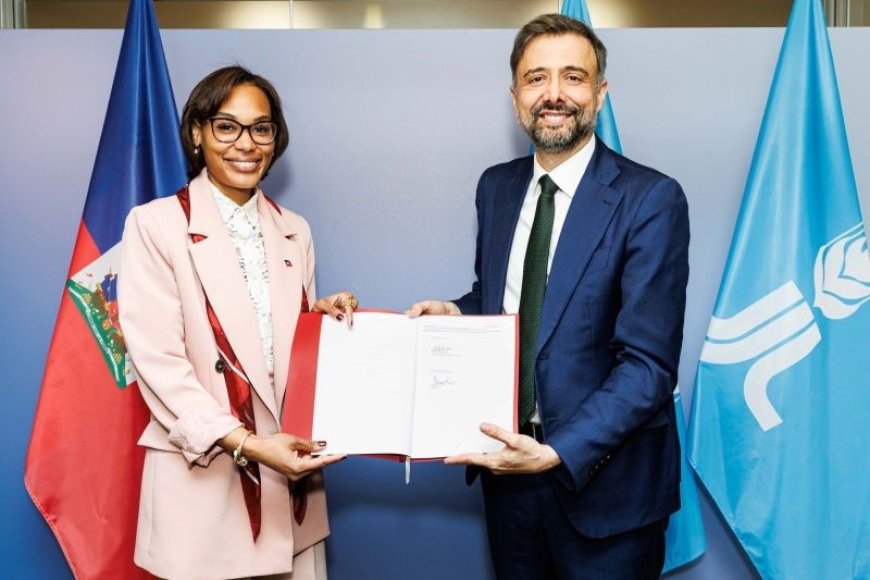IFAD and Haiti Sign Financing Agreement to Strengthen Rural Development and Climate Resilience
IFAD and Haiti partner to strengthen rural livelihoods, diversify food production, and build climate resilience through a new financing agreement. Learn how this initiative aims to foster stability, food security, and long-term development.

IFAD and Haiti Sign Historic Financing Agreement to Strengthen Rural Livelihoods and Build Climate Resilience.
In a big step towards the enhancement of stability and sustainable development, the International Fund for Agricultural Development (IFAD) and Haiti signed a historic financing pact. The pact is centered on the enhancement of rural livelihoods, diversification of food, and enhancing the ability of rural communities to cope with major climate shocks. The pact is a milestone in IFAD's collaboration with Haiti, as it seeks to address both immediate issues as well as long-term development goals.
A Two-Pronged Approach: Humanitarian Action and Sustainable Development.
The new financing agreement underscores the imperative of connecting humanitarian response with sustainable rural development. By investing in rural economies and fostering self-sufficiency, IFAD and its partners are creating conditions that allow the dividends of crisis response to endure long after humanitarian interventions have ceased. In this manner, rural communities are not only able to recover from crises but are also empowered to thrive on their own.
"Humanitarian action and rural development in the long term go together," declared Estelle-Laure Gilles, pointing to the initiative's integrated character. "Through the establishment of local economies and self-reliance, we are making investments in the factors that will make the gains from crisis response possible even after the humanitarians have left."
Priorities: Food Security, Job Creation, and Stability in Localities
The deal focuses on a series of key priorities, namely:
Strengthening Rural Livelihoods: By empowering smallholder farmers and rural entrepreneurs, the program aims to improve income opportunities and reduce poverty in rural areas.
Diversifying Food Production: The project will promote diversification of agriculture to enhance food security and reduce dependence on a single crop or industry.
Constructing Climate Resilience: As Haiti is highly vulnerable to climate change, the program will work towards increasing the ability of rural communities to withstand shocks from severe weather conditions, such as hurricanes and droughts.
Investment in Rural Infrastructure: Improved infrastructure, such as roads, irrigation systems, and storage facilities, will improve agricultural productivity and market access.
These efforts are expected to lay the foundation for broader development, including improved food security, job creation, and the stabilization of rural communities. By addressing the root causes of poverty and vulnerability, the initiative aims to create a more sustainable and resilient future for Haiti’s rural population.
A Collaborative Effort for Rural Transformation.
Success of the program will rely on cooperative work among IFAD, the Haitian government, and the local stakeholders. Through their coordinated efforts, they will enhance rural transformation in areas where it is most needed and ensure that benefits of the project are extended to the most vulnerable groups.
We look forward to working with Haitian officials and partners to catalyze rural change where it is needed most," said Estelle-Laure Gilles. The partnership reflects shared commitment to the empowerment of rural communities and building a more stable, prosperous Haiti.
A Milestone for Sustainable Development.
The signing of this credit agreement is a milestone in IFAD's ongoing support for promoting sustainable development in Haiti. With investments in agriculture and rural infrastructure, the initiative not only meets critical needs but also lays the foundation for long-term stability and growth. This holistic strategy is aligned with global goals for sustainable development, climate resilience, and poverty reduction.
While Haiti still faces genuine challenges, this alliance offers hope and a clear path to a more resilient and independent future. Through global collaboration, innovation, and continued investment, IFAD and Haiti are mapping the way for rural transformation.
 Kinyarwanda
Kinyarwanda
 English
English










































































